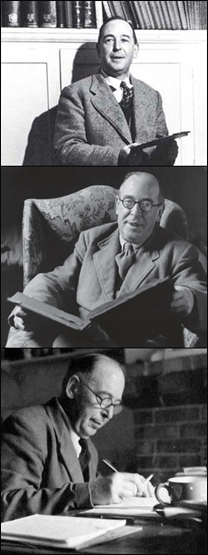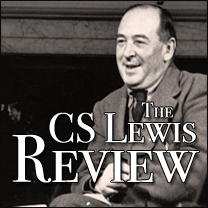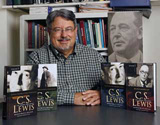
"Fine Nets and Stratagems": A Review of Planet Narnia
March 12th, 2008 | Skip to comments
 Planet Narnia: The Seven Heavens in the Imagination of C.S. Lewis by Michael Ward (Oxford University Press, 2008)
Planet Narnia: The Seven Heavens in the Imagination of C.S. Lewis by Michael Ward (Oxford University Press, 2008)
A review by Megan J. Robinson
“In reading Chesterton, as in reading MacDonald, I did not know what I was letting myself in for. A young man who wishes to remain a sound Atheist cannot be too careful of his reading. There are traps everywhere – “Bibles laid open, millions of surprises,” as Herbert says, “fine nets and stratagems.” God is, if I may say it, very unscrupulous.”
~C.S. Lewis, Surprised by Joy
I was eight or nine years old when my parents gave me The Chronicles of Narnia for Christmas. I devoured them. And kept devouring them in subsequent years, even those years when anything to do with Christianity and faith in a Person were anathema to me. Oh, I knew Lewis was a Christian, and there were Christian elements to the Chronicles, but that knowledge was subsumed by the fact that these were, quite simply, good stories. For a while, that was all with which I concerned myself. I yet maintain their “good storiness;” if one wants to read a well-crafted and delightful fairy tale, look no further.
However, good stories often have at back of them something that lies hidden, grander and greater than cursory glimpses indicate, waiting to reveal itself; perhaps I, like Lewis, should have been a little more careful in my choice of books to devour. After twenty years of reading the Chronicles, and several years of wending my way back to the Christian faith, I discover myself caught by the same “fine nets and stratagems” as Lewis, these good stories having revealed Something and Someone far greater and grander than I realized. According to Dr. Michael Ward, Lewis was even sneakier with his stratagems than anyone has hitherto suspected.
As Ward notes in his introductory chapter of Planet Narnia: The Seven Heavens in the Imagination of C.S. Lewis, theories abound as to the compositional coherence of the seven books that make up The Chronicles of Narnia. Some critiques follow Lewis’ colleague and friend J.R.R. Tolkien in considering them a literary and mythological hodge-podge, “carelessly and superficially written” (8). Others attempt to explain the series’ enduring and enthusiastic readership with varying suggestions of an underlying consistency, an internal coherence that unifies and justifies the seeming disparities juxtaposed throughout the Chronicles. Yet, as Ward notes, though the series might look random or disjointed, Lewis never admitted it to be so; as a medievally-minded writer and thinker by training and inclination, he would have manifested his own dictum, that “intricacy is a mark of the medieval mind” (11).
Though he addresses the “problems” of occasion for and reception of the Chronicles, Ward devotes most of Planet Narnia to this “problem of composition,” and provides a theory and argument that follows Lewis’ medieval mindedness: that the Chronicles exhibit the structure and characteristics of the seven planets of the medieval cosmology. Seen in this light, the series begins to display a sensible and artistic unity, as well as a more significant and meaningful complexity, that enriches and informs a new reading of the Chronicles.
Drawing upon the entirety of the Lewisian corpus, and specifically on the early poem “The Planets,” and the Space Trilogy, Ward shows Lewis’ intellectual and imaginative fascination with the medieval cosmology throughout his pre- and post-conversion literary works. Each chapter provides evidence of each of the planetary personalities and their manifestations in its corresponding book in the Chronicles: Jupiter for The Lion, the Witch, and the Wardrobe; Mars for Prince Caspian; Sol for The Voyage of the Dawn Treader; Luna for The Silver Chair; Mercury for The Horse and His Boy; Venus for The Magician’s Nephew; and, Saturn for The Last Battle.
Ward cites such instances as the creation and engagement of militaries in Prince Caspian as evidence of Mars; the frequent appearance of gold, and the overwhelming light of the sun – Sol – that pervades The Voyage of the Dawn Treader (my personal favorite); and, to skip a few, the destruction of Narnia and the final appearance of Father Time in The Last Battle as the presence of Saturn. I confess to a forehead-smacking, well-why-didn’t-I-think-of-that? moment. Once the planets and their personalities are explained, and their manifestations in the Chronicles revealed, Ward’s theory fits the series neatly together, and one wonders how this could have gone overlooked for so long. Which then begs the questions: how was it overlooked, and why didn’t Lewis say anything about it?
A partial explanation of this slow revelation lies in the fact that, in the wake of the scientific revolution and the Enlightenment, like Eustace Scrubb, we now know “of what the planets are made,” but not what they are: the planets as archetypes and symbols that speak to our subconscious are no longer are part of our general and regular discourse. However, the strength and support of Ward’s argument rests on his insistence that Lewis a) valued secrecy, both personal and literary (medieval intricacy again), and b) loved literature that provided “atmosphere”: not that it was just a sequence of excitements or events, but that the very sequence itself evoked a state or a quality. This is what Lewis called this the “kappa element,” and in his essay “On Stories” likened it to a “net whereby to catch something else,” the real (hidden) theme being something “other than a process” that pervades the story and the reader’s imagination (17).
Ward further deploys the encompassing term “donegality” (which Lewis coined in his lesser read posthumous work, Spenser’s Images of Life), to denote this state or quality underlying and encapsulating Lewis’ philosophy of Enjoyment, a total immersive experiencing of something (versus Contemplation, an abstracted observation). Donegality is the atmosphere to be Enjoyed, so pervasive that it is unnoticeable, because we are constantly experiencing it.
As Ward observes, Lewis believed that “what the reader is made to do for himself has a particular importance” (240), and to give away from the beginning the donegality of the Chronicles as manifested by this medieval cosmology would diminish the Enjoyment of dawning revelation.
Additionally, Lewis himself may not have fully understood, in the beginning, what exactly he was working out in his creation of a fairy tale, though it may have been prompted by, as Ward speculates, the desire to work out imaginatively what he had been debating philosophically in Miracles.
A final question: if Lewis wanted it hidden, why reveal it now, if at all? In answering this, Ward uses the example of an art historian uncovering the meaning behind the enigma of Mona Lisa’s smile. Wouldn’t knowing what prompted such a tantalizing smile increase our enjoyment? Well, no. Deciphering that puzzle – she could have been smiling at the dog chasing the cat – hardly enriches the viewing and re-viewing of da Vinci’s painting. If the key to her smile were discovered, the painting would cease to draw us in, would move us from Enjoyment to Contemplation, because it is the puzzle itself that increases Enjoyment. In this case, Ward’s argument that knowledge for its own sake enhances Enjoyment admits more for Mona Lisa and less for Lewis.
Rather than being just another datum of knowledge added to what we know about the Chronicles and Lewis, this medieval cosmological key opens a door, ushering us from a pleasant and pleasurable room that hitherto delighted, but for our now catching a glimpse of a great and complex country of enriched and enhanced pleasures out beyond the threshold.
As Lewis considered knowing God and His work in creation of primary importance, so ought we to keep in mind while laying this new layer of knowledge over our prior reading(s) of the Chronicles. Solving this puzzle ought to please us, not for the sake of solving it, but because it inclines us, subtly and ultimately, to the knowledge and awe of God, who “walks everywhere incognito.” And is that not the beginning of wisdom?
Planet Narnia displays Dr. Ward’s careful and erudite scholarship. Yet, my one criticism of the work is that its often dry, academic tone may render it less accessible to a broader, more popular audience. Ward’s thoughtful and precise exposition of his argument, and his references to primary and secondary sources bolster his claim admirably; but reading through it all is sometimes a bit of a slog. As there is much to delight anyone with a strong interest in the Chronicles and in Lewis, this is a shame, but careful and patient reading will reward those who give it their time and attention (and keep a good dictionary at hand!).
My original set of the Chronicles is about twenty years old, quite lovingly dog-eared now, and though I have a shiny new set, in their supposed “better order,” I cannot give up the wardrobe in disguise that first took me into Narnia along with Peter, Edmund, Susan, and Lucy. Ward’s Planet Narnia increased, if possible, my love for and Enjoyment of the Chronicles, and my admiration and respect for Lewis as a writer and scholar. I am led, once again, “further up and further in” to where the whole of creation is alive to its Creator, the “heavens declare the glory of God,” and all creatures their Creator bless. Which shows, if I may say it, just how unscrupulous Lewis could be.
References
Lewis, C.S. “On Stories.” On Stories and Other Essays on Literature. San Diego: Harvest, 1982. 3-20.
—. Surprised by Joy: The Shape of My Early Life. 1956. San Diego: Harvest, 1984. 191.




Have you seen Paul F. Ford’s opinion of Dr. Ward’s book? I, for one, can’t understand why there are any people out there who don’t instantly see that Dr. Ward is right. I imagine there are some fundamentalists (with whom Lewis is already in hot water because of magic and witches) who will either reject Dr. Ward’s astrological thesis or grasp it and reject Lewis finally (then, of course, they should have known Lewis better, should have done so based on The Discarded Image or That Hideous Strength). That is not, of course, to say Paul F. Ford is a fundamentalist, but that does make me wonder (indulging in a bit of Bulverism, perhaps) just why he is against the whole thing.
Cheers!
Comment by Bob — 20 March 2008 @ 2:16 PM